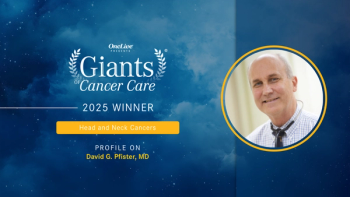
Lenvatinib in RAI-Refractory Thyroid Cancer
For High-Definition, Click
Lenvatinib is an oral multikinase inhibitor, which targets predominantly the fibroblast growth factor (FGF) receptors, vascular endothelial growth factor (VEGF) receptors, platelet derived growth factor receptor (PDGFR)-alpha, RET, and others. The FDA approved lenvatinib in 2014 for radioactive iodine (RAI)-refractory differentiated thyroid cancer (DTC), based on results from the phase III SELECT trial.
In this study, 392 patients with progressive RAI-refractory DTC were randomized to receive lenvatinib or placebo. According to Matthew H. Taylor, MD, the objective response rate with lenvatinib was 64.8% versus 1.5% with placebo. Median progression-free survival (PFS) was 18.3 months with lenvatinib compared with 3.6 months with placebo (P < .001).
As an investigator on the trial, Taylor notes that he personally saw a dramatic reduction in tumor size in treated patients, along with durations of response of over 3 years. Interestingly, PFS was substantially less in those who crossed over from the placebo arm to the lenvatinib group, suggesting that patients with more advanced disease may have a lower probability of response to treatment, Taylor observes.
Treatment with lenvatinib slows down rapidly progressive tumors, R. Michael Tuttle, MD, describes; however, an optimal time to begin treatment is still unclear. Given the benefits seen, waiting until patients are symptomatic to initiate the drug may not be appropriate, Tuttle suggests.
The most common adverse events associated with lenvatinib include hypertension, proteinuria, ankle welling, sore throat, difficulty swallowing, and joint pain, all of which can be managed with supportive care medications or a dose reduction. Since a high percentage of patients develop hypertension on lenvatinib, Taylor recommends the use of a blood pressure cuff at home to monitor blood pressure from the start of treatment.


































